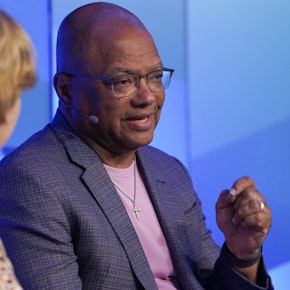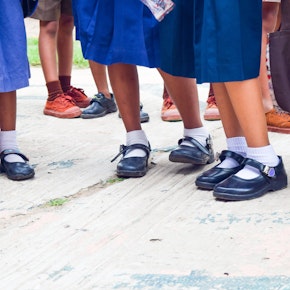Explore
Search results

The innovative philanthropist who paid off the student debt of the entire graduating class of Morehouse College class of 2019 talks about how to ensure all communities benefit from the digital revolution.

The pandemic has exposed long standing inequity when it comes to access and adoption of critical technologies, from broadband connections to laptops to digital literacy. These are the necessary conditions for children to learn, for young adults to acquire needed skills, for adults to find jobs, and to ensure everyone has access to the services they need. In this conversati...

Artificial intelligence is generating enormous excitement for its potential to predict health risks, speed diagnoses, and guide medical decision making. At the same time, the algorithms that make AI so powerful carry an inherent danger of bias, as some models are known to return lower accuracy results on risk assessment or even exclude certain populations from clinical stu...

With many students returning to school from the comfort of their living rooms, educators are using this unique period to address long-standing problems of equity.

While internet connectivity, technology, and digital skills are central to every part of modern life, the unfortunate reality is that millions of Americans have been left behind. We’ll discuss how transformational investment in digital equity and inclusion is helping close the digital divide.

Setting audacious goals helps to redefine what is achievable in health, medicine, and science. As we deepen understanding of the human genome, unravel the mysteries of the brain, harness the power of AI, and target new vaccines and therapeutics, we push the boundaries of knowledge. Moonshots underway in cancer, nutrition, and health equity could be game changers, taking us...

Renowned psychologists Lisa Damour, author of The Emotional Lives of Teenagers, and Laurence Steinberg, author of You and Your Adult Child, delve into the complex landscapes of adolescence and young adulthood in today’s society. Both have devoted their careers to studying and understanding adolescents — Damour as a clinical psychologist working with families and organizati...

Whether we are using apps to count steps or talking to our doctors via video, most of us are already familiar with digital health in some form. But innovation at the intersection of health and technology—with its promise of improving health outcomes, enhancing patient satisfaction, and strengthening the healthcare system—is just getting started. Not only is technology bett...

New genetic technologies have the potential to cure disease, alleviate hunger, and lead a clean energy revolution. But with these powerful new possibilities come with a range of consequences and ethical questions. Such questions might in theory be addressed in interdisciplinary, transparent settings. But the current system of scientific discovery encourages siloed work fro...

Computer systems don’t anticipate all the types of people who might use them. What are the innocuous, and more problematic, consequences of this?

Meet Neale Batra, a 2022 Aspen Ideas: Health Fellow who's on a mission make the field of epidemiology more efficient, collaborative, and equitable through open-source software and training resources.

As our society grapples with the ramifications of developments like machine learning and genetic testing, a surprising new generation of even more powerful technological advances is already brewing in labs. Researchers are teaming up with machines to create reasoning systems that reach beyond the mere correlations in data to understand the underlying causal mechanisms in e...


Introducing the new redesigned Aspen Ideas Festival website!



Soon, we may be able to visualize any biological process in the human body, at any scale, in real time. Here’s what it will take to get there. Presented by Chan Zuckerberg Initiative.

